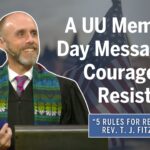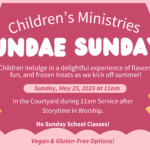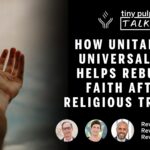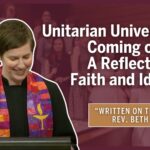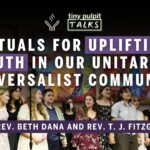Keeping the Flame: Then, Now, and Always | Rev. Dr. Daniel Kanter | 09.08.2024
Sermon Transcript
Well, I know what you say about this place. I know because I meet your friends and co-workers around Dallas, and they make this connection between me and the church and you. It goes something like this, “Oh, you’re the minister of that church on Forest Lane?”
“No, that’s the Unity Church, that new age, power-positive thinking church. We’re Unitarian. We’re next to the Y on Preston.”
“Oh. Oh, yeah. I know someone who goes there,” fill in the blank, your name. “They love it,” they say. They say, “You’re all so engaged in so much.” They say, “It’s not really a church.” I mean, they say, “It’s kind of a community, not a churchy kind of thing. You know what I mean? It’s not like the Catholic Church.”
“Certainly not,” I say. “We’re are a big tent, a lot of Catholics in the room.” But I say, “We have Catholics who attend, but we’re also a church, a community, a progressive place that has 500 years of history. You know, open, but something, not nothing.”
“Oh, yes,” they say. “They love it. My friend loves it. What time are your, what do you call it, worship services?” I know it’s not easy. I know. I know. It’s not easy to define who we are. I know you struggle with that, and it’s okay. I mean, I’m the one who tells people on airplanes that I am an accountant for a dog food company, so let’s face it, I get it, but hopefully this year we might make some progress on this with you.
You’re not alone. This church has been trying to define who it is for the last 125 years. A member of the church sent me this first notice in the Dallas Morning News from June 26th, 1899, a small box on a page of this thing that people used to and read at breakfast called newspapers. It said, and I quote, “To the news: Unitarians, Universalists and others interested in the organization of a liberal church in Dallas are requested to meet at the parlors of McLeod Hotel tonight, Monday at 8:00 for the purpose of taking steps to organize a Unitarian Church. Not only those who wish to connect themselves with such a church are welcome, but all who would like to know about our principles are invited to be present. Very cordially, D.C. Limbaugh.”
In the first public worship held in October later that year, Daniel Limbaugh, D.C. Limbaugh, lay minister who came here from Mississippi gave his famous charter sermon, “People are at sea without a chart and compass and making shipwrecks of their religious natures. The old creeds seem to them unworthy of the character of God, the nature of man and the highest conception of human duty and destiny.” More on that sermon in October.
But just to note, this is a interesting thing that in the notice in the newspaper 62 years before the merger, they are inviting Unitarians and Universalists, I guess because they needed each other in this frontier town of conservative religious people in 1899. Think about what they were dealing with. Think back to what it might’ve been like in 1899 by the time this church was forming and in 1903 when they formed that constitution that Beth read earlier. The church may have had 50 or 100 members. The city had 35,000 rough and tumble people trying to recover from the Civil War, from slavery, from not long after the war to separate from Mexico.
The environment for Unitarians would’ve been Christian. The rise of what we call the evangelical church today was happening right here. The organization of the Ku Klux Klan was happening right here. The spirit of this place was tough on liberals, and you thought you had it bad.
These were courageous people. Services were held at 11:00 AM and 8:00 PM. The first wedding in the church was performed in June between Valerie Eisenlohr and Carl Helmley, founding families of this church. The Women’s Alliance gave the couple a pudding dish. There were three ministers in five years, and our history says that in 1904 when the Russo-Japanese War erupted, Reverend Evitt left the church. I don’t think there was a correlation, but I don’t know.
And then Reverend Ham, Marion Ham came from Massachusetts. Ham wrote hymns we still sing and will sing after this sermon. Ham hosted President Theodore Roosevelt here in the church, worked for an ecumenical understanding, helped create the first city-wide Thanksgiving service, which was led by him, the minister of the Unitarian Church, a Catholic priest, an Episcopal priest, a Presbyterian, the minister at First Baptist Church, imagine that, the minister at Methodist Church and a rabbi from Temple Emmanuel. Different times, similar times.
Of course, we have grown, we have changed. We have transformed with the times, and the point of all this is that we have been in existence for 125 years now. A big celebration in October, but the kickoff of this theme year right now is where we look at what it means to have so much history in this place, and all that starts today. The way we are, the decisions we make matter, the way they mattered when they wrote that constitution in 1903.
It matters what we do and whether today we are upbuilding the hearts of people for the highest ideals of rational, progressive, and exalting religion in the love of God and the service of all as it says in that constitution. It matters that we answer the call to proclaim to the world the glories and grandeur of our religion of love because too many people in Dallas, I don’t know if they’re making shipwrecks of their spiritual lives, but they’re still having that conversation with me that I described earlier.
The church thrives both because of our insistence to up build a society of reason and spirit and love and to proclaim that we exist. And one truth is real is that it matters a lot more what we do than what we say. This church has been through a lot over these 125 years of which we will talk about some this month and next month. Some of that history is known and some of it is lost. Some of the ministers will stand out and some will not. Some courageous actions will be instructive to what we can be.
And one minister and one action stands out to me today. You have heard me talk about Reverend Robert Raible, or otherwise he was known as “Daddy” Bob Raible. He was a small figure with a big presence who moved to Dallas having lived in Kentucky and Massachusetts to be the minister of this small church in 1942. As the war was raging, Raible took a stand before a board meeting when he asked his board to consider the desegregation of the church. The story is that the debate lasted long into the night, that Raible said nothing during that meeting, and they all knew that it would be a bold statement for a church in the Deep South, the home of the strongest KKK force in the country to proclaim itself desegregated in 1944.
At the end of the board meeting they voted, yes, they would desegregate and they would publicly state they welcomed all. In the Dallas phone book, those things that used to land on our front step that had all our names and addresses and phone numbers, ask your grandparents if you haven’t ever touched one of those, there were churches listed in the phone book by racial category. There were white churches listed. There were Black churches listed, and there were other churches listed. There was only one church in the other category. After that board meeting, the board chair took Reverend Raible aside and asked him, “Had the vote gone the other way, would you have resigned two years into his ministry?” To which Rabel said, “Indeed, I would have.” The church grew 350% in 10 years with Raible.
Something tells me, having read all of his sermons in the Harvard archive, that he knew what he was doing. He knew that the church had moved from downtown to this, its own city in Dallas called University Park, a place which was designed to keep Black people out. He knew that this place with its own school system, its own police force and its own government, was designed with that intention in mind. And he knew that desegregation in 1944 was not only the right thing to do, but a stance that it would take to build up the courage of its white members and to enhance the courage of people of color who would come then and come now, which takes so much more of to come through the borders of University Park.
And here we are, friends, a church. Not a community or something, a church, a progressive church proclaiming the glories and grandeur of our religion of love. A church that has helped start the largest mosque in this country by handing the keys to the first Muslims who came to Dallas. A church that started the first gay church, the Cathedral of Hope, in this country because no other church would allow them to worship in. A church that pitched for same-gender marriage years before it was popular. A church that has built the infrastructure to ensure a woman’s right to having children or not having children and more.
As Unitarian Universalists in Dallas, whether it was 1904 or 1944 or 2024, we don’t always find ourselves in this situation of feeling terribly courageous to tell people these things or even being ready for such change. We don’t always feel like we’re worthy of God or love or doing the work of upbuilding anything. I share that same feeling. But I’ve read Reverend Raible’s words, and he knew this. And he said to his congregation all through the forties and the fifties and the sixties, think about all the things that faced in that time. He said, “One of the greatest handicaps is our unwillingness to accept our own wholeness. That we were made not for the world as it is, but for the creativity which transforms the world.”
He said, “The Unitarian Church is a free faith for free people who can discover truth for themselves.” And thus, as I read these words, I believe he knew that we could both proclaim loudly that we are a people of faith going to a church and not shrink back when the world seems troubling or troubled, that we could use that creativity to stand for things that are important in our communities.
Defining the church for his people, Raible, people who probably mumbled a lot when asked where they went to church, he reminded them that a faithful courage is what upbuilds a society of reason, spirit, and love. That courage even when we don’t feel courageous bubbles up when we remember that we have one another, and that this marathon of spiritual life means continually seeking that inner resource of the soul, a connection to God and finding ways to conquer our fears.
Raible is famous for saying one thing, his core theological statement, and that was that people are precious. By which I think he meant that people are precious gifts of God, precious potentials and hopes in our time, precious enough to care about when we are tempted not to care and precious enough to love even when undeserving.
To be one of us in this place, I know, I’ve been to the city council meetings, a place that really doesn’t even want to see us or acknowledge us. To be one of us in this place is to live out this undying call to love the preciousness of humanity with all its spectacular failings, with its fears and its resilience to face them, with its ego balanced by its moments of humility, with its faithfulness, with its faithlessness, with its hope and its hopelessness.
For me, the purpose of this church is and has been to build up what I call the Kingdom of God that’s not found in the Bible. I mean a place that makes room for all people. A place that stands up to conformity culture that surrounds us and points away to see the preciousness in everyone. A place that serves in humility, that combats loneliness and meaninglessness at every turn. A place to make a difference in real lives, to work in what I call the new social gospel, which means addressing the needs of real people in our community and to not shrink back when we are asked who we are or what we stand for.
What we do matters, and that is why I’m thrilled to kick off this 125th anniversary year. We’re calling it, “Keeping the Flame Then, Now and Always,” because I know you understand why this place matters here in Dallas and beyond. And if you don’t, I know you will study and pray and find ways to make this place sing courage into your heart. And when someone asks you where you go to church, you will proclaim the glories and grandeur of our religion of love. And you might tell them something like this, “It’s a church that like none that you have ever attended or where you’re welcome whoever you are. Where Jesus is spoken of but not worshiped. Where truth is sought out, not doled out. Where you explore your spiritual journey alongside amazing, courageous people, and where you don’t just talk about the world, you work to make our values come alive in a city and beyond.”
And if you can’t remember that, we’re going to post that somewhere. This is the work, this day and this place and next week, and this whole year is the work and legacy of our faith and of those people who started this place. I invite you to be part of it this year, to walk with me and to walk with this congregation and this holy work, this holy work we do together. Keeping the flame then, now, and always, amen and amen.




